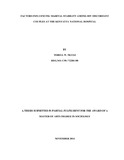| dc.description.abstract | The aim of this study was to establish factors that influence marital stability among HIV
discordant couples. The study objectives were to determine the extent to which socio-
economic status, therapeutic social interventions, demographic characteristics and culture
influence marital stability among HIV discordant couples registered for group therapy at KNH.
A cross-sectional study using mixed-methods approach randomly sampled 132 participants
with each participants being a partner in a discordant couple marriage. Semi structured
questionnaire were administered to each participant individually and four focus group
discussions were conducted, two with the HIV negative and two with the HIV positives
participants.
Findings showed that female respondents were more likely to report fear that marriage will not
work and that their partners may desert them; this was mainly experienced by those who were
HIV positive and economically dependent upon their partners.
Although most (55.8 percent) couples agreed that religion played an important role in marital
stability, what came out strongly as having influenced marital stability was nature of
interpersonal relationship among the couples which was indicated by 72.8 percent of the
couples agreeing that their pattern of communication and openness among partners enhanced
marital stability and 75.8 percent agreeing that trust and commitment to the relationship made
them stay married.
Social support and therapeutic social interventions was perceived as having enhanced marital
stability in both focus group discussions and individual interviews.
Based on the findings of this study, the researcher recommends that therapeutic social
interventions like support groups and couple counseling be reinforced among HIV discordant
couples immediately after testing. With these interventions in place; interpersonal relationship
among the partners will be enhanced and hence their marriages will remain stable. | en_US |

